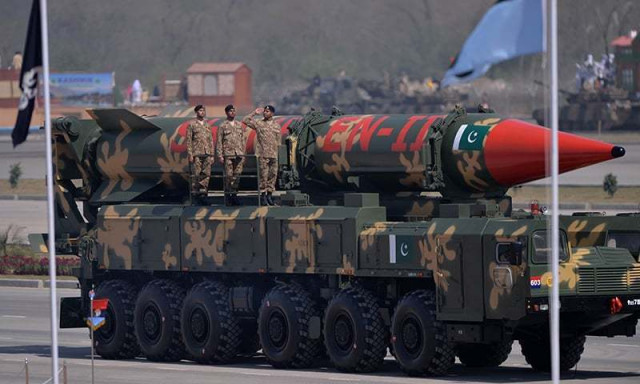Ishaq Dar hints at increase in defence budget
Ministry of Defence seeks Rs920b for year 2016-17, Dar fails to mention whether or not he would allocate the amount

Ministry of Defence has sought Rs920 billion for fiscal year 2016-17. PHOTO: AFP/FILE
“The government will meet the defence needs of the country in the new budget,” vowed Dar, while addressing a pre-budget seminar organised by Express Media Group.
US Senate panel clears bill to block $300m military aid
As against Ministry of Finance’s indicative defence budget of Rs860 billion for fiscal year 2016-17, the Ministry of Defence has sought Rs920 billion. In its presentation to the Senate Standing Committee on Defence, military authorities have already termed Rs860 billion insufficient.
Finance Minister Dar, however, did not mention whether or not he would allocate Rs920 billion.
Military authorities also want to take 100% of the Coalition Support Fund that the United States disburses in return for the country’s services in the war on terrorism.
Dar announced that in the next budget, the government would try not to put extra burden on existing taxpayers. He, however, said the life would be made miserable for non-filers of the income tax returns. “The customs duties will be lowered for growth-oriented industries,” he said.
“The budgets are made as if there is complete peace in the country but the reality is that the country has been in a state of war for the last 38 years,” said Muhammad Ziauddin, former executive editor of The Express Tribune while speaking at the seminar.
Defence spending goes up to Rs781 billion after 11% hike
He proposed that military and civilian leadership sign a charter of economy, unlike Dar’s proposal seeking an agreement among the country’s political parties.
Ziauddin said the finance minister has been making budget in the dark, as he did not know how many mouths have to be fed next year due to delay in holding a population census.
PPP Senator Osman Saifullah Khan complained that parliamentarians have been excluded from the budget-making exercise. He identified unemployment, income inequality and regional disparity as main economic challenges.
“The government policies in several business sectors are resulting in transfer of resources to special segments at the cost of the public,” he said, adding that the government was violating the Constitution by not ensuring equitable regional development.
PTI’s Shah Mehmood Qureshi criticised the finance minister for not fulfilling promises that he made while delivering his first budget speech. He said Dar had promised to stop hemorrhaging of Public Sector Enterprises, address root causes of circular debt, expand tax base and increase pace of national output. The progress in all these areas remained below the targets, said Qureshi.
Budget 2016-17: India increases military spending by less than 1%
“The government could not stimulate economy in last three years,” he said while counting one after another the failures of the PML-N government. He said the agriculture sector has been adversely affected due to neglect of both federal and provincial governments.
“The government’s Kissan package was a trick with farmers. This year the cotton output has massively declined, a situation which has not only ruined the farmers but will affect the textile industry,” he added.
Qureshi also criticised the government’s wrong priorities, which according to him would further complicate economic issues. He came hard on the government over setting up coal-based power plants in Punjab instead of establishing them near seaport and coalmines.
Due to low investment, unemployment was the biggest problem of the country, said Arif Habib, one of the leading industrialists of the country. “Had I been finance minister, I would have exclusively focused on investment,” he said. “Economy cannot grow without investment and without economic growth; unemployment cannot be reduced in the country.”
He said that due to heavy taxation, cost of doing business was very high in Pakistan. Habib proposed the government to withdraw bonus share, reduce the rates of capital gains tax on stock exchange, abolish capital value tax and give incentives on real estate investment.
Published in The Express Tribune, May 25th, 2016.



















COMMENTS
Comments are moderated and generally will be posted if they are on-topic and not abusive.
For more information, please see our Comments FAQ